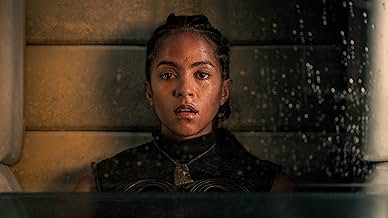La humanidad vive dispersada en numerosos planetas por toda la galaxia bajo el mandato del Imperio Galáctico.La humanidad vive dispersada en numerosos planetas por toda la galaxia bajo el mandato del Imperio Galáctico.La humanidad vive dispersada en numerosos planetas por toda la galaxia bajo el mandato del Imperio Galáctico.
- Nominado para 2 premios Primetime Emmy
- 3 premios y 29 nominaciones en total
Explorar episodios
Resumen
Reviewers say 'Foundation' is a visually impressive sci-fi series with strong performances, especially from Lee Pace and Jared Harris. However, it faces criticism for significant deviations from Isaac Asimov's original books, including changes in character genders and storylines. Some viewers appreciate the modernization, while others feel it loses Asimov's essence. The series is lauded for its production values and epic scope but faulted for inconsistent writing and pacing. Non-book readers tend to enjoy it more, while original fans express disappointment.
Reseñas destacadas
... Its name didn't need to be Foundation. Imo, it's about 50% Asimov and the rest is a combo of soap opera, sc-fi-imperial politics, CGI explosions and Webb-esque space vistas. Heck, you could claim several other writers' materials were influences. Lots of this series is purely mainstream, outer space SF.
But it's excellent SF! Captivating sub-plots, likable characters and gorgeous images are extremely entertaining! In its own right, it is a superb show. Aye, and there's the rub... A "show" isn't necessarily literature. Michael Crichton and James Patterson were/are graphic oriented writers, evoking a "screenplay" feel in their fiction, which isn't meant as a detraction. Excellent easy read authors! Asimov isn't as frugal a wordsmith, however, and there are probably as many different visual interpretations of scenes in his books, as there are readers of his books. But then again, this is series is just loosely "based" on his work, whether it is expressly acknowledged or not.
But it's excellent SF! Captivating sub-plots, likable characters and gorgeous images are extremely entertaining! In its own right, it is a superb show. Aye, and there's the rub... A "show" isn't necessarily literature. Michael Crichton and James Patterson were/are graphic oriented writers, evoking a "screenplay" feel in their fiction, which isn't meant as a detraction. Excellent easy read authors! Asimov isn't as frugal a wordsmith, however, and there are probably as many different visual interpretations of scenes in his books, as there are readers of his books. But then again, this is series is just loosely "based" on his work, whether it is expressly acknowledged or not.
Foundation is an intriguing sci-fi series that grows on you the more you watch it. At first, it can feel confusing-just as you're starting to get to know a character, they disappear, only to return much later, if at all. Then you're introduced to someone new, and the whole process of connecting with a character begins again. On top of that, events unfold across different locations, and the series makes massive jumps in time-particularly long ones between seasons.
I've completed Seasons 1 and 2. One of the show's strengths is that as each season progresses, the seemingly loose ends begin to tie together and make sense. Many odd or minor events and details-even from the very first episode-are only explained later in the season or in the finale. But if you keep your eyes and ears open, you might catch subtle clues that help you make sense of things as they unfold. Almost nothing is said without a reason. While Season 1 is built largely on suspense, Season 2 leans more toward action.
The series features numerous plot twists that help keep viewers engaged. Many come out of nowhere and aren't always happy or innocent-but that's part of the fun. In many ways, it resembles Dune, especially in tone and scale. However, one of Foundation's most distinctive traits is its pacing: at times, things move very slowly, only for the show to suddenly jump forward by decades, suggesting sweeping generational changes and the loss of familiar characters.
I've completed Seasons 1 and 2. One of the show's strengths is that as each season progresses, the seemingly loose ends begin to tie together and make sense. Many odd or minor events and details-even from the very first episode-are only explained later in the season or in the finale. But if you keep your eyes and ears open, you might catch subtle clues that help you make sense of things as they unfold. Almost nothing is said without a reason. While Season 1 is built largely on suspense, Season 2 leans more toward action.
The series features numerous plot twists that help keep viewers engaged. Many come out of nowhere and aren't always happy or innocent-but that's part of the fun. In many ways, it resembles Dune, especially in tone and scale. However, one of Foundation's most distinctive traits is its pacing: at times, things move very slowly, only for the show to suddenly jump forward by decades, suggesting sweeping generational changes and the loss of familiar characters.
Magnificent bouts of rich storytelling often feel diluted by cheap and pointless moments of juvenile entertainment. While the core of this series held the potential to become an ode to the greatest science-fiction writer of all times, it would appear that Apple couldn't keep itself from interfering in their typical (biased) politically correct, family friendly fashion. You stand on the shoulders of a giant, and behind that giant stand millions of minds inspired by a vision of the future the whole of humanity can rally behind. The implications of the existential questions raised by Asimov are not PG-rated, this shouldn't be either.
When I read Asimov's 'Foundation' novels I was somewhere in my middle teenage years, more than 50 years ago. What I remembered was the central idea of psychohistory, but not much else.
When the first season of 'Foundation' screened in the Fall of 2021 I was deeply committed to the HBO series by Ridley Scott, 'Raised By Wolves' and the ambitious character driven political allegory 'The Expanse' airing on Prime. Both were challenging explorations into deeply complex ideas living up to the best that literary science fiction is known for.
Whatever my mood at the time, I found the first couple of episodes meeting most of my expectations, but then I seemed to loose the thread of the show as it left a central character behind and seemed to veer into a good guys versus bad guys realm of conventional space opera. I wrote a rather sour critique at the time that expressed my disappointment.
However, I started watching season two and decided to go back and review the first season. This time I was able to not only stay with the plot, but its choices made much more sense to me. I was newly impressed, to say the least, and could barely remember my specific criticisms on the first go-round.
Now I have a taste for what so many critics felt years after they first panned films like 'Blade Runner' and '2001:A Space Odyssey' before they recognized them as pioneering accomplishments. I wouldn't necessarily place 'Foundation' at the level of those films, but as an extended series it successfully tackles some profound questions about time and history and human behavior that are becoming ever more pertinent in today's climate of ongoing political crises.
The show runners project a run of 8 seasons to complete a narrative that even Asimov failed to finish. It'll be a remarkable achievement if all of the necessary factors, corporate, financial and otherwise hold up to make it to the end. Here's hoping.
When the first season of 'Foundation' screened in the Fall of 2021 I was deeply committed to the HBO series by Ridley Scott, 'Raised By Wolves' and the ambitious character driven political allegory 'The Expanse' airing on Prime. Both were challenging explorations into deeply complex ideas living up to the best that literary science fiction is known for.
Whatever my mood at the time, I found the first couple of episodes meeting most of my expectations, but then I seemed to loose the thread of the show as it left a central character behind and seemed to veer into a good guys versus bad guys realm of conventional space opera. I wrote a rather sour critique at the time that expressed my disappointment.
However, I started watching season two and decided to go back and review the first season. This time I was able to not only stay with the plot, but its choices made much more sense to me. I was newly impressed, to say the least, and could barely remember my specific criticisms on the first go-round.
Now I have a taste for what so many critics felt years after they first panned films like 'Blade Runner' and '2001:A Space Odyssey' before they recognized them as pioneering accomplishments. I wouldn't necessarily place 'Foundation' at the level of those films, but as an extended series it successfully tackles some profound questions about time and history and human behavior that are becoming ever more pertinent in today's climate of ongoing political crises.
The show runners project a run of 8 seasons to complete a narrative that even Asimov failed to finish. It'll be a remarkable achievement if all of the necessary factors, corporate, financial and otherwise hold up to make it to the end. Here's hoping.
Good story, lots of action. If you like good sci-fi shows/stories, then you'll like this one. The characters are engaging and the good ones draw you in and make you care what happens to them. It starts out at medium speed, it's not slow at the start, it's just laying out the story for you. Mid season 1, starts to really pick up and season 2 is amazing, non stop drama and action. The Empire is run by 3 clones, all of their loved leader Cleon. Brother Dusk is the oldest, Brother Day (who is the ruler at the time), and Brother Dawn, the young adult ruler who will become Brother Day when he is of age. They keep moving up the ladder as they age. Hari is a brilliant mathematician, whose talent is psycho-history and that future events can be predicted mathematically. Hari gets people together, slowly to attempt to end the rule of the clones & their empire with his predictions. Couple of storylines that come together all for the same cause.
New and Upcoming Sci-Fi and Fantasy
New and Upcoming Sci-Fi and Fantasy
From popular franchises to brand new worlds of exploration, science fiction and fantasy stories are more popular than ever. Check out our list of the best and brightest new and upcoming movies and series.
¿Sabías que...?
- CuriosidadesAsimov's Foundation was originally published as a short story series in Astounding Magazine between May 1942 and January 1950, based on ideas in Edward Gibbon's History of the Decline and Fall of the Roman Empire.
- Créditos adicionalesThe opening titles is a montage of radiant energy particles forming various shapes.
- ConexionesFeatured in Late Night with Seth Meyers: Paul Rudd/Jared Harris/Nate Smith (2021)
Selecciones populares
Inicia sesión para calificar y añadir a tu lista para recibir recomendaciones personalizadas
July 2025 TV and Streaming Premiere Dates
July 2025 TV and Streaming Premiere Dates
"Foundation" and "Dexter: Resurrection" are two of this month's most anticipated TV releases. Check out our July calendar for more!
- How many seasons does Foundation have?Con tecnología de Alexa
- Is this based on the Asimov Foundation series?
- Is the series based on the original trilogy, or the entire Foundation series (and thus ties in with all of Asimov's future history)?
- Which other streaming services will Foundation Show on?
Detalles
- Duración1 hora
- Color
- Relación de aspecto
- 2.00 : 1
Contribuir a esta página
Sugerir un cambio o añadir el contenido que falta






























